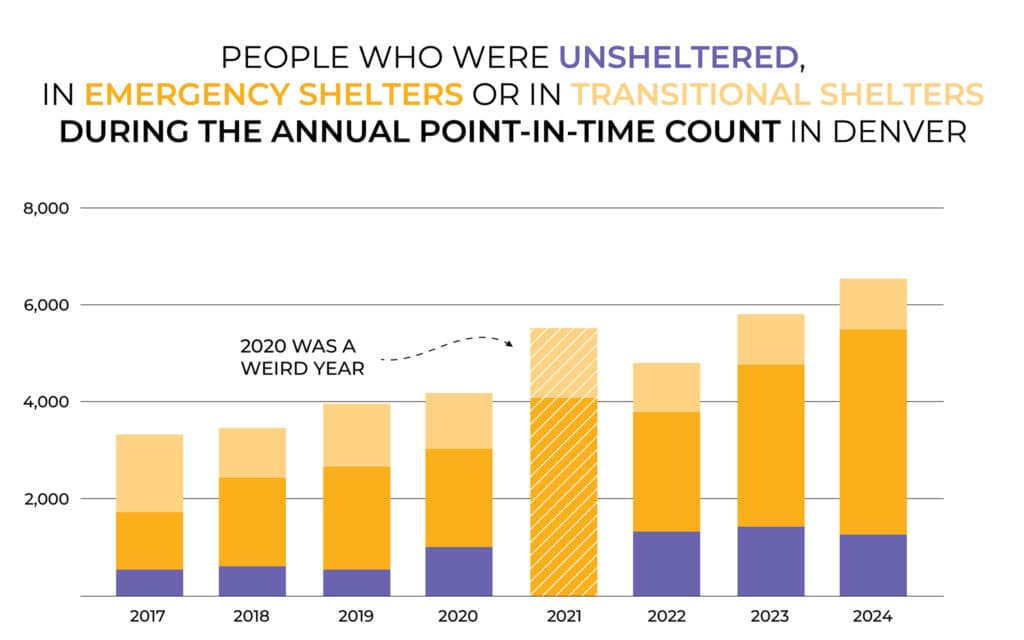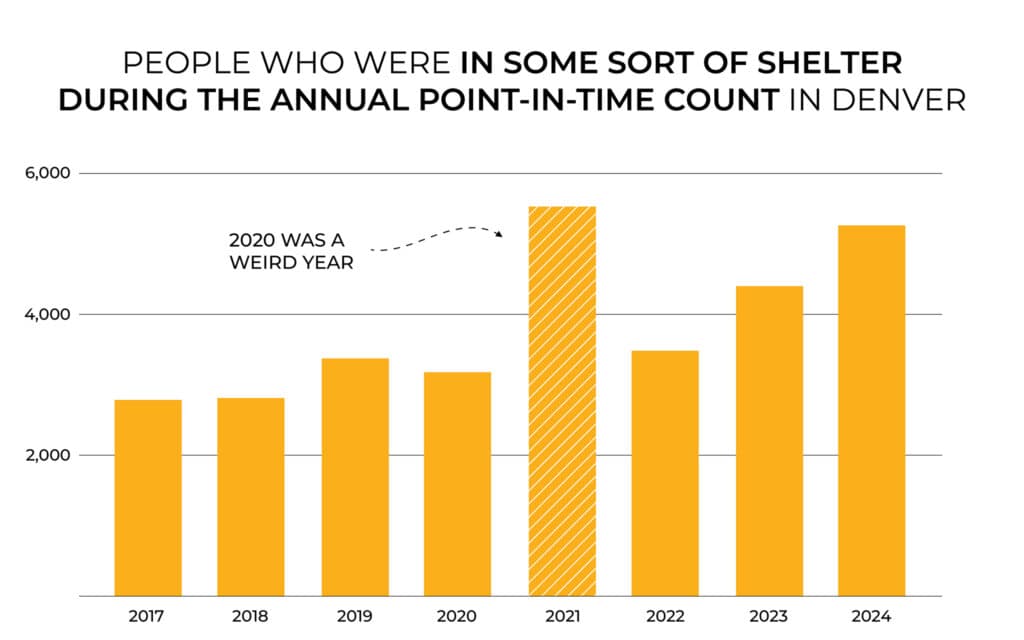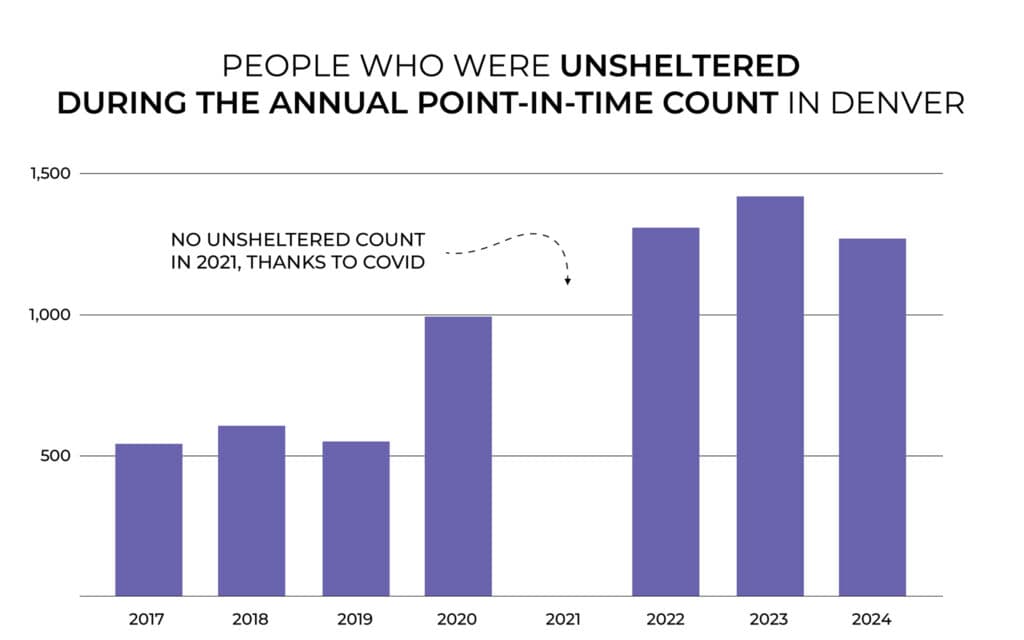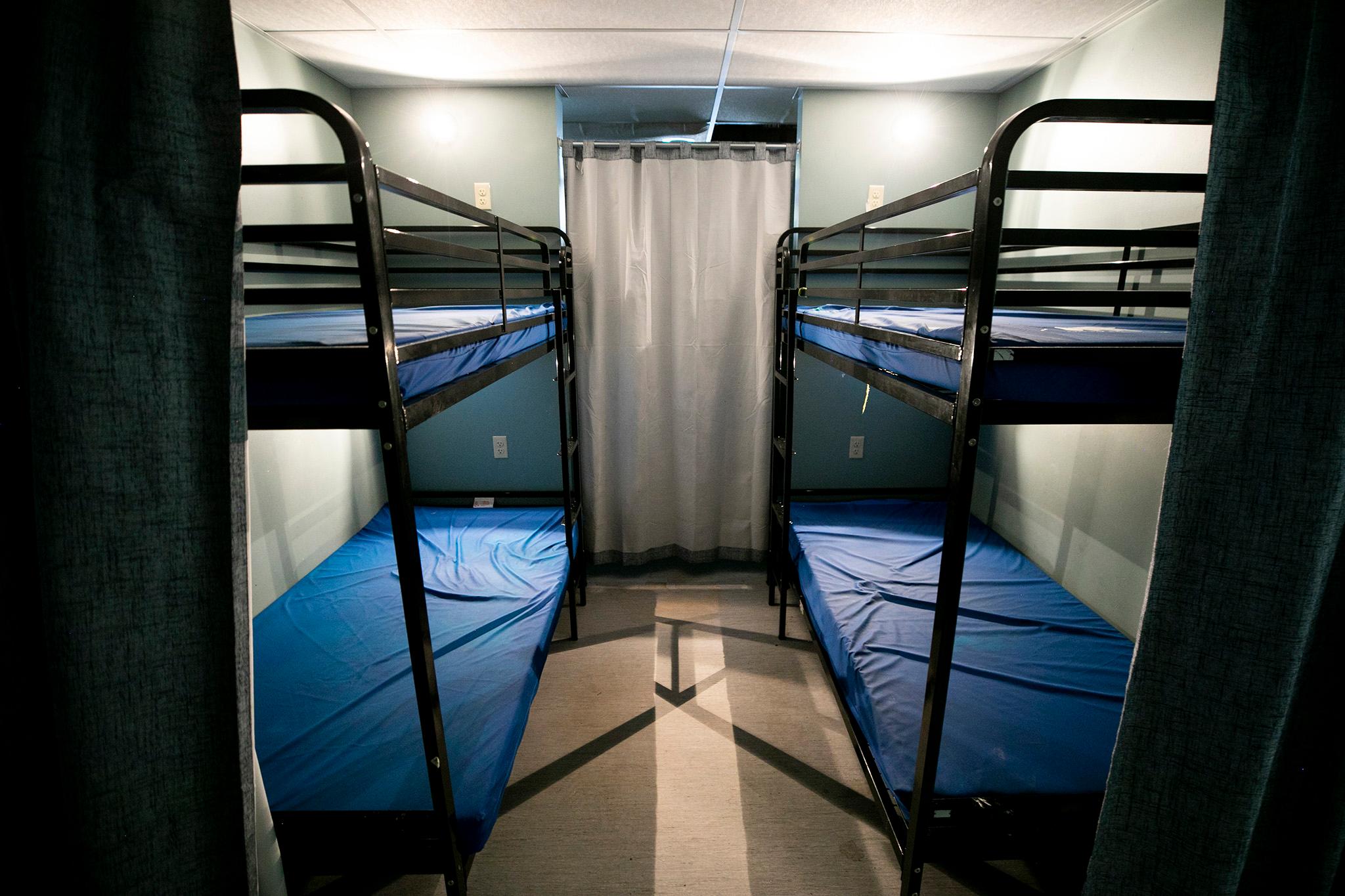Updated at 4:43 p.m. on Wednesday, Aug. 14, 2024
Homelessness increased by 10 percent in the metro Denver area this year, according to Metro Denver Homeless Initiative’s annual Point-in-Time count data.
The Point-in-Time count aims to capture the number of people experiencing homelessness in the metro area by counting people both on the street and in shelters during a single day in January each year. This year’s count, released on Wednesday, was done between sundown on Jan. 22 and sundown on Jan. 23.
The count includes Denver and its surrounding counties, while similar efforts take place nationwide in coordination with the federal Department of Housing and Urban Development.
It’s an imperfect science, with weather and methodology changes affecting data year to year. But the information helps local and national nonprofits and government agencies respond to Denver’s homelessness crisis.
This year, volunteers counted 9,977 people experiencing homelessness in the metro area, compared to 9,065 people during the 2023 count.

Homelessness has been rising for years. Between 2022 and 2023, the overall number of people counted increased by 31.7 percent.
“Behind every data point lies the reality of individuals and families facing the hardship of homelessness,” said Rebecca Mayer, interim executive director at Metro Denver Homelessness Initiative in a statement Wednesday. “It's crucial to remember that our unhoused neighbors deserve the stability and security of a safe place to call home.”
The entire Denver metro saw an increase in the number of people using shelters.
The growth in homelessness this year was largely driven by a 12 percent increase in people using shelters, according to Metro Denver Homeless Initiative.
“While fewer people are experiencing homelessness for the first time, the number of chronically homeless individuals rose by 16 (percent),” wrote Metro Denver Homeless Initiative in a statement Wednesday.
For Cathy Alderman, Chief Communications and Public Policy Officer for Colorado Coalition for the Homeless, the growth in chronic homelessness speaks to the state of Denver's housing market.
"That just means that they're staying in the cycle of homelessness longer, and that screams that, we know we have a housing crisis in Denver, but it's probably even worse than we think," she said.

The count also found that the number of families experiencing homelessness has “grown significantly” by about 49 percent, from 2,101 families in 2023 to 3,136 families experiencing homelessness in the metro area this year.
"That's one of the most troubling things about the report," Alderman said. "We know that homelessness has an even more detrimental impact on kids."
What about Denver homelessness specifically?
The overall number of people experiencing homelessness in Denver rose by about 12 percent, from 5,818 people in 2023 to 6,539 people in 2024.
While unsheltered homelessness rose in the metro area at large, the number of unsheltered people sleeping outdoors in Denver dropped by about 10.5 percent, from 1,423 people to 1,273 people.

That’s after Mayor Mike Johnston’s administration spent more than $100 million opening non-congregate hotel shelters and micro-communities to bring people sleeping on the streets indoors.
In a statement Wednesday, Johnston attributed the rise in people living in shelters to those efforts, which closed more than a dozen encampments and moved more than 1,000 people indoors, often to non-congregate shelters.
Denver’s figures also do not include the 4,300 new immigrants to Denver who were staying in Denver’s temporary migrant shelters that night, just a few weeks after new immigrant arrivals peaked in early January.
Mayor Mike Johnston is touting the results as a win for the city.
He spent much of his campaign and early days in office promising to bring 1,000 people indoors by the end of 2023.
In a statement Wednesday, one success he pointed to an 82.5 percent drop in unsheltered family homelessness — from 103 to 18.
But the overall number of families experiencing homelessness in Denver grew by about 58 percent.
Johnston also touted the decrease in tents across the city, including a 23 percent drop in people living in tents and cars. According to the Mayor’s office, Denver has about 117 tents currently up in the city, versus the 242 tents counted in January.
Meanwhile, the number of people staying in shelters grew compared to 2023.
"We have always believed that homelessness is a solvable problem, and now we have the data to prove it,” Johnson said. “In just six months we were able to achieve transformational reduction in unsheltered homelessness while building an infrastructure that will allow us to attack this issue for years to come. Denverites should be proud to live in a city that responds to homelessness with compassion.”
Cole Chandler, Johnston's senior advisor for homelessness resolution, said he thinks the city's efforts to bring people out of unsheltered homelessness are working. He attributes the overall growth in homelessness to Denver's persistent housing crisis.
"I think we're getting better at helping get people out of homelessness. We're getting more effective at that," he said. "We're doing a better job, and yet people are still falling into homelessness. And so I think that just underscores the affordable housing crisis that we're in the midst of."
The overall rise in Denver homelessness is coupled with record-breaking eviction numbers.
Denver is currently on track to break eviction records, with more than 9,000 filings already this year. The city also broke eviction records last year, and residents quickly maxed out local rental assistance funds.
Meanwhile rents remain high and a recent poll showed that Denverites increasingly worry about cost of living — like many people nationwide.
Johnston hopes his proposed sales tax will help prevent new homelessness in the long term. The .5 percent sales tax, which needs approval from City Council and then Denver voters, would generate $100 million per year to fund affordable housing.
Editor's note: This article was updated to include comment from Alderman and Chandler.












